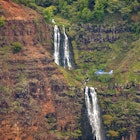

Kauaʻi's state parks offer exceptional vistas, geological marvels and some of Hawaii's best hiking trails and beaches © Per Breiehagen / Getty Images
Though there are no national parks on Kauaʻi, the island features five state parks that offer exceptional vistas, geological marvels and some of Hawaii's best hiking trails and beaches.
From the rugged Na Pali Coast to the waterfalls along the Wailua River, here are our top tips for exploring the best of the Garden Island via its public lands.
Kokeʻe State Park
Best all-around for birding, fishing, hiking, camping and more
Perched 3600ft above sea level, this 4345-acre park on Kauaʻi’s west side is an outdoor playground, with campgrounds, rustic cabins and 45 miles of hiking trails through native forests, along ridgelines and even through a swamp-like montane wet forest.
Birders can find many of Hawaii’s endemic avians here, from the white-rumped ʻapapane (Hawaiian honeycreeper) to the elusive pueo (Hawaiian owl). Families can explore the park along one of several easy hikes, like the half-mile nature loop through a lush forest or the 3-mile Canyon Trail to the top of Waipoʻo Falls. And more adventurous hikers can score epic views of the Na Pali Coast on the Awaʻawapuhi trail, a 6-mile round-trip trek that ends on a ridge 2500ft above sheer cliffs and two verdant valleys.
10 essential hiking trails on Kauaʻi for exploring the Garden Island
If you'd like to catch rainbow trout, Kokeʻe's public fishing area – which includes certain streams, reservoirs and ditches in the park – is open to anglers from July 13 to September 30. (You'll need a valid fishing license.)
First-time visitors should stop at Kokeʻe Natural History Museum, which has information and artifacts about the park. The knowledgeable staff can also advise you on hiking trails and current conditions. Find Hawaiian books, locally made crafts and souvenirs at the gift shop.
Kokeʻe Lodge is the only one restaurant in the park, and it's only open until 4:30pm, so if you want a later meal, you’ll have to head into Waimea town. The lodge menu features pancakes, loco moco, local beef burgers, chili and lilikoʻi (passion fruit) chiffon pie. Yes, there’s a bar – and it serves a great mai tai using locally made rum and a nice selection of Hawaii beers.
Visiting Kokeʻe State Park: The park is located 42 miles northwest of Lihuʻe Airport, and because of the winding roads leading there, it can take more than an hour to drive. You’ll want a rental car; from the airport, rides via Uber or Lyft can start at $75 one way.
Because you’ll be 3200ft to 4200ft above sea level, expect temperatures to drop as you drive up. Temperatures can range from 68°F in July to 45°F in January (and yes, that’s cold by Hawaii standards).
The park is open during daylight hours. Entrance fees are $5 for non-Hawaii-resident visitors (free for residents and children 3 and under), and parking is $10 per vehicle (free for Hawaii residents). If you’re planning to camp, you’ll need a permit, which costs $30 per night ($20 for residents) for up to 10 people at Site 1, and six people at all other sites. Children under 2 are free.

Waimea Canyon State Park
Best for canyon views and nature walks
Visiting Waimea Canyon is one of the most popular visitor attractions on Kauaʻi – and rightfully so. Aptly nicknamed the "Grand Canyon of the Pacific," this 14-mile-long, 2-mile-wide and 3600ft-deep natural wonder was carved by the Waimea River over millions of years, and it's spectacular, with deep valley gorges, rugged crags and a palette of earthen colors. Its name means “reddish waters” in Hawaiian and describes color of the river’s water as it erodes the canyon's red volcanic walls.
One of the best places to see the canyon is in Waimea Canyon State Park, at the overlook at Mile Marker 10. From here, you can catch a glimpse of the 800ft Waipoʻo Falls. Go when it’s sunny, or even better, after heavy rains, as the colors are brighter and bolder. (You can also check out the canyon via hiking trails and helicopter tours.)
But the park is more than just the canyon lookout. If you wander Iliau Nature Loop, an easy trail on the western edge of the canyon, not only will you get great views of both Waimea and Waiʻalae canyons, you’ll see native upland plants, including the iliau, a green relative of Maui’s famous silversword that’s endemic to the west side of Kauaʻi. More experienced hikers might opt for the 5-mile round-trip Kukui Trail, a steep and scenic path leading 2000ft down to the canyon floor. You can camp here with a permit.
Visiting Waimea Canyon State Park: The park is about 35 miles northwest of Lihuʻe Airport, en route to Kokeʻe State Park. It’s open during daylight hours. Entrance fees are $5 (free for Hawaii residents and children 3 and under). Parking is $10 per vehicle (free for residents). If you’re planning to drive the extra 5 miles to Kokeʻe State Park, your parking ticket should be valid there too.

Haʻena State Park
Best for swimming and snorkeling in summer
Once you cross the historic one-lane bridge into Hanalei, you’ll feel immediately relaxed and on vacation. This is what most people dream about when they’re planning their Kauaʻi holidays: gorgeous sandy beaches, charming shops and no big resorts in sight.
At the end of Kūhiō Highway, Haʻena State Park is the gateway to the Na Pali Coast. From here, you can access some of Kauaʻi’s most beloved places, from Makua (aka Tunnels) Beach and its amazing snorkeling to the 22-mile round-trip Kalalau Trail winding along the rugged coastline.
The park is also home to several ancient Hawaiian sites, including sea caves thousands of years old. Right across the highway from Haʻena Beach Park is Maniniholo Dry Cave, a deep and broad cave that’s big enough to explore. (It’s not really dry; there‘s water dripping from the cave walls, so expect it to be damp and humid.)
Haʻena Beach is a beautiful stretch of white sand with good swimming and snorkeling in the calmer summer months. (Winter brings monster surf and dangerous ocean conditions.) Makana, a 1115ft mountain above Limahuli Valley, looms in the distance – it was featured in the 1958 film South Pacific as Bali Hai, a name still used today.
Nature lovers can book a tour of nearby Limahuli Garden, run by the nonprofit National Tropical Botanical Garden in the lush Limahuli Valley. It contains collections of Hawaiian ethnobotanical and medicinal plants and other endangered native species found nowhere else in the world. Tours take an hour and a half and run Tuesdays through Saturdays ($25 for adults and $10 for Hawaiʻi residents; kids ages 17 and under are free).
Keʻe Beach, at the end of Highway 560, offers amazing views of the Na Pali Coast. It’s also the start of Kalalau Trail.
Parking is extremely limited and advanced reservations are required. For years, the community has been frustrated with the illegal parking, traffic along the narrow two-lane road and litter on the beaches, so be mindful when you’re visiting this area.
Visiting Haʻena State Park: Haʻena State Park is located about 37 miles north of Lihuʻe Airport, and driving there can take upwards of an hour and a half, depending on traffic.
The entire park – including Keʻe Beach and the Kalalau trailhead – is subject to daily visitor limits, and advanced reservations are required for both entry and parking. You'll also need a valid camping permit if you’re staying in the Na Pali Coast Wilderness State Park.
The park is open from 7am to 6:45pm daily. Entrance fees are $5 (free for residents and children 3 and under). If you walk or bike in, it’s $1 per person. Parking is $10 per vehicle (free for Hawaii residents) and only valid during the time slot chosen at purchase.

Wailua River State Park
Best for water-based activities like boating and stand-up paddleboarding
The center of Wailua River State Park is the 20-mile-long Wailua River, Hawaii’s only navigable inland waterway for boats larger than kayaks. On any given day, the river is dotted with kayakers and stand-up paddleboarders, many of them heading to the 100ft Secret Falls (though it’s not much of a secret anymore).
There are several tour operators that take visitors in kayaks up the tranquil river and on foot to the falls – a great experience for adventurers and outdoorsy families. You can also take a riverboat cruise to Fern Grotto, a unique fern-covered cave set in a tropical garden, with views of ʻOpaekaʻa and Wailua falls. Smith’s Kauaʻi offers a 90-minute tour on a rear-engine open-air boat, which includes a stop to walk through a rainforest to the lush grotto.
This area is also one of the most sacred spots on Kauaʻi. The river, which flows from the 5148ft Mount Waiʻaleʻale, once meandered through seven different heiau (ancient Hawaiian temples). Wailua was once the center of chiefly power on the island, with refuge sites (puʻuhonua), ancient petroglyphs, and sacred stones where women of high rank would give birth. Many of these important sites can be found along the Wailua Heritage Trail, which you can also visit virtually.
Visiting Wailua River State Park: Just 5 miles from Lihuʻe Airport, this state park has no entrance fees. It’s open for daily use from 7am to 6:45pm. The busiest days on the river and at the falls are Saturdays and Sundays, when residents join visitors to enjoy this lush area.
Polihale State Park
Best for spreading out on the beach minus the crowds
Stretching 17 miles long, the 140-acre Polihale State Park boasts one of the biggest beaches in Hawaii. And its hard-to-get-to location – a 5-mile drive along an unpaved dirt road at the end of Kaumualiʻi Highway – means this park is often uncrowded.
The beach itself is huge – 300ft wide in some places, and backed by sand dunes 50ft to 100ft tall – and while it's not a swimming beach, it’s perfect for long walks, beachcombing, lounging and marveling at the Na Pali Coast. (The safest place for a dip is an islet called Queen’s Pond.) There’s minimal shade, so it can get scorching hot. Be sure to bring food and water.
Visiting Polihale State Park: Located at the end of Kaumualiʻi Highway on Kauaʻi’s west side, it takes well over an hour to drive to Polihale State Park from Lihuʻe Airport. The park is open from 5:30am to 7:45pm daily, and there’s no entrance fee. Camping is currently not allowed. You may need a vehicle with four-wheel drive to get here, and some car rental companies prohibit driving on it.
You might also like:
10 essential hiking trails on Kauaʻi for exploring the Garden Island
The best things you can do for free in Hawaii
Accessible Hawaii: the best things to do for travelers with disabilities and additional needs
Explore related stories


 BeachesWhere are the best beaches in the US? Check out these 28 shoreline destinations to explore and enjoy.
BeachesWhere are the best beaches in the US? Check out these 28 shoreline destinations to explore and enjoy.Aug 21, 2024 • 24 min read








